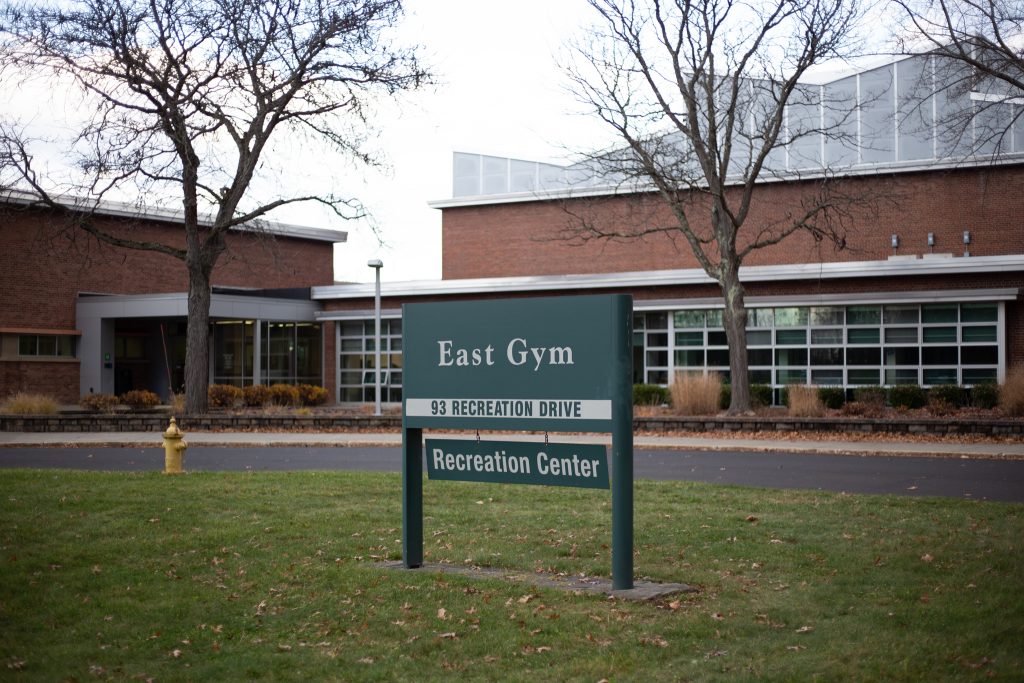Following student opposition and a Student Association (SA) Congress resolution, East Gym administrators will tentatively begin dissolving the dress code.
Last December, the SA Congress unanimously passed a resolution calling on Campus Recreation to modify the East Gym’s dress code, allowing students to wear clothes that expose their torso. The resolution, authored by Mackenzie Cooper, the chair of the SA Congress’ Finance Committee and a Dickinson Community representative, and Batia Rabin, the chair of the SA Congress’ Internal Affairs Committee and a Newing College representative — both sophomores majoring in philosophy, politics and law — aimed at making the dress code more inclusive and coherent. Almost a year later, the resolution may have led to a change in East Gym policy, according to Cooper and a discussion at the Nov. 7 SA congress meeting.
“Now, almost one year after our original piece of legislation was passed, I was informed by one of my peers that the East Gym employees have been told by their administrators to ‘phase out the dress code’ once and for all,” Cooper wrote in an email.
Cooper and Rabin wrote the legislation last year following student-led protests and a petition that gained over 150 signatures calling to reform the dress code. The initial resolution was supported by six voting sponsors and nine non-voting sponsors — including representatives from Girl Gains and a track athlete.
The petition said that, while the dress code had been in place since 2013, the East Gym only began strictly enforcing it in the 2022 fall semester.
Currently, the East Gym’s dress code policy requires gym-goers to wear full-length shirts with sleeves and “modest” full-coverage shorts. Any clothing that exposes the torso, stomach, back, ribcage and chest is prohibited. In the East Gym’s FitSpace, the dress code is even more specific, requiring that all shirts reach the waistband of all bottoms. According to Campus Recreation, the policy is in place to “[reduce] the chances of acquiring an illness or infection — such as [Methicillin-resistant Staphylococcus aureus (MRSA)] — and also [protect] the equipment from degradation from body oil.”
The resolution pointed out that while the East Gym mandates wearing modest clothing in the gym, it only suggests that people wipe down equipment before and after use. In the resolution, they stated that instead of focusing on the dress code, East Gym should more strictly enforce the policy of wiping down equipment, which would reduce the spread of illness and protect equipment, while allowing students to wear their preferred gym attire.
Laura Cichostepski, Campus Recreation’s assistant director of marketing, said that while administrators are currently exploring options, they “don’t have anything official to share at this time.”
Another issue Cooper and Rabin addressed in the resolution was that the dress code needed to be more specific. According to Rabin, posters in the FitSpace identifying what clothes were or were not acceptable were not clear, and in some cases, not enforced equally.
“We wanted the East Gym to be more specific in how they defined their dress code, because we had looked at the poster they had, and it looked like very similar shirts were both OK and not OK to wear,” Rabin wrote in an email. “Also, we had heard there had been cases where men and women wore the same shirt and one was dress coded and the other wasn’t so we wanted it to be more specific.”
Following the passage of this resolution, Cooper and Rabin met with East Gym administrators — including Clyde Robinson, the former director of campus recreational services — to discuss the dress code. The meeting ended with an agreement to provide more comprehensive images of what clothing is permitted and change the name of the policy from “dress code” to “health policy.”
Almost a year after the resolution was passed, Cooper was informed that East Gym administrators would begin to phase out the dress code. While the exact reforms to the dress code are unknown, Cooper expressed her excitement at the potential changes.
“It is so fulfilling to know that as a student, I was able to make real change happen on my college campus and that my efforts to continue to follow through on this piece of legislation and my push for real, substantial change was accomplished,” Cooper wrote.



